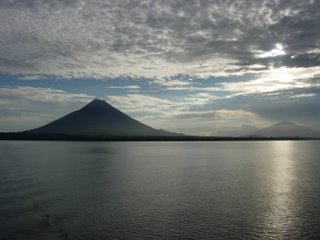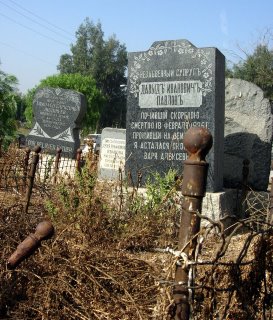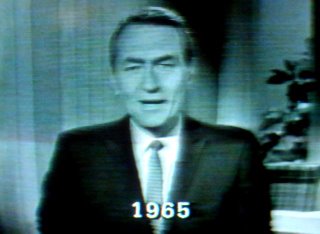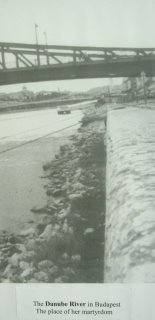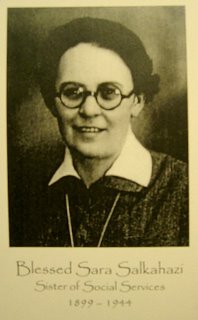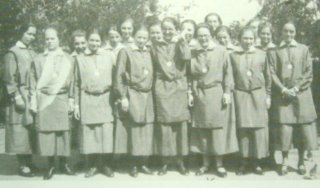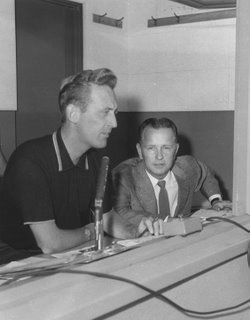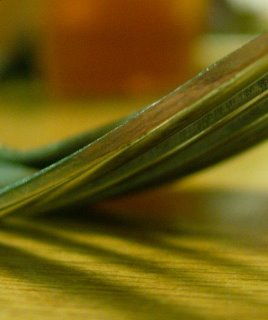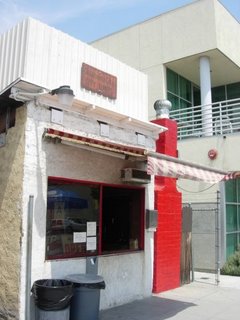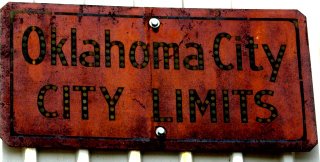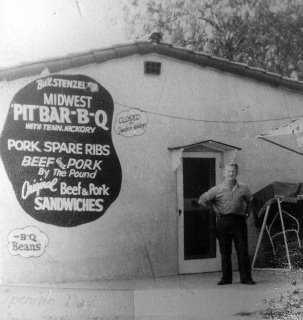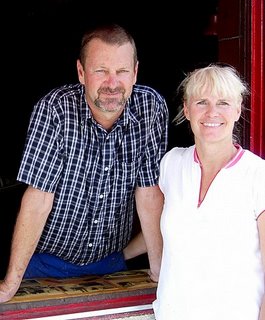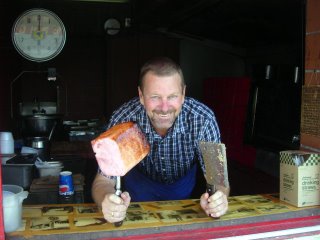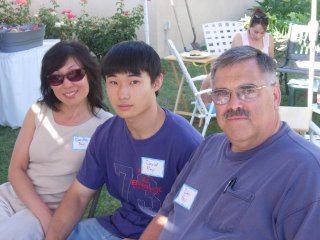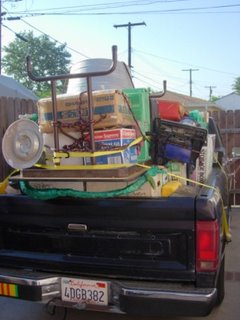The great thing about being back in Burbank is that it's a rich, buffet of international and American culture. It's not a melting pot, because everyone seems to be able to serve up their own delightful recipes and dishes.
Everyone around here seasons the neighborhood with their unique and sometimes exotic ingredients -- ingredients that reflect their ethnicity, their religion, their heritage ani their unique passions.
And the best way to appreciate this community cuisine of sorts is to send out the universal invitation -- just post a sign that reads, "Yard Sale."
We live on a neighborhood thoroughfare that does not discriminate. A tired-but-sturdy 1982 Toyota enjoys the same right of way as a slick, 2006 BMW or an overworked, 1999 Ford Ranger. And the tree-shaded sidewalks provide equal service to the seniors or the yuppies who walk their dogs and to the families -- sometimes comprised of four generations in one group -- who don't have access to an automobile to take them to church or to the retail stores down the street.
I wish I had posted a world map somewhere near our little table. I could have highlighted all of the different countries the visitors represented. I could have shaded in Italy, France, Mexico, Armenia, Iran, Lithuania, Greece, Turkey, Russia, Korea, the Philippines, Lebanon, China and Germany. I think there would be more, but I didn't ask everybody.
Four of my early visitors were two young women and their two dogs: a most beautiful, giant, slobbering, black Newfoundland and a most remarkable German shepherd feller who was in love with the her (the Newf).
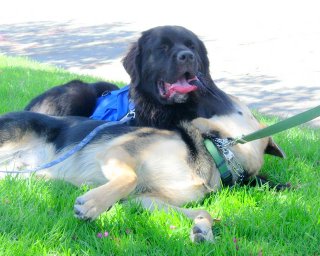
The great thing about Newfs is that they love people, and hugging them is probably the closest thing to hugging a black bear without the risk of losing any body parts.
As big and bulky as they are, they're a lot like bull seals -- they're most at home in the water. They have webbed feet and they live to rescue people from the water.
But on land, they're not as agile. In fact. this furry girl had just come from the nearby Starbucks with her doggie boyfriend and their owners where she had stood up too quickly and somehow shoved the little, round, metal, outdoor table into the plate glass window. It was a miracle that the giant shards of glass did not slice any body parts off of them or their neighbors.
I know the story because, while I was rolling on the ground with the big, black, drooling machine, her owner was on the cell phone with her boyfriend or someone giving the after-the-fact play-by-play -- including her fervent belief the the incident was, indeed, the fault of the Starbucks folks. It was obvious to her that they should have bolted the tables to the ground.
This dispute would have been nonexistent if it had happened in Nigeria or Serbia (if you're a first-time reader, you may enjoy going back and reading about my adventures there). But in the U.S.A. it's all about who's to blame and, in the end, nobody admits responsibility.
(Begin personal rant)
Wouldn't it be surprising if someody did some bonehead thing and then said something like, "Geez, I didn 't mean for that to happen. Can I pay for the damages?" I know that all of the judges and lawyers reading this are about to fire off missives to me about my childlike naïveté. I have this belief that if everyone took responsibility for the things they did, we'd have a lot fewer lawyers and, as a dual result, we'd have a lot more doctors. And they'd both charge less.
Yard sale? Oh yes. (End of rant)
One of the more serendipitous things that happened was my reconnection with a most wonderful woman, Maria McFaller. She's in her early 70s, I believe, but has the spiritual energy of a hyper five-year-old. We met years ago when she was walking past my house after her car had broken down. She first made friends with my dog, Mija (Mija 1) and then with me.
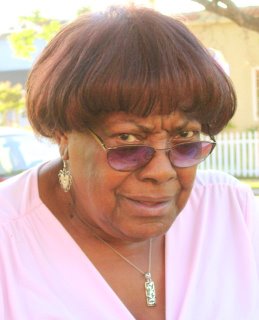
Maria can't hide her Southern roots, her love for people or her love of God. Love of God means going to the foursquare church up the hill just about every Sunday, either before or after sitting a spell at Frank's Coffee Shop down the street from her place. The foursquare church is the closest thing, she says, to the Pentecostal sermans and revivals of her youth in Memphis.
"I don't go to no church where people sit still, " she said while she raised her hands to the sky and shook her body to some lively him or spiritual that was mostly in her head. "People got to move and dance to the music of the Lord," she said, with a Pentecostal zeal.
Maria lives in a senior apartment complex a block away from our place, but she still drives her new, compact car around town and to work. She works at Universal Studios Hollywood in the theme park -- been working there for nearly three decades. She practices the other activity about which she's passionate -- she feeds folks.
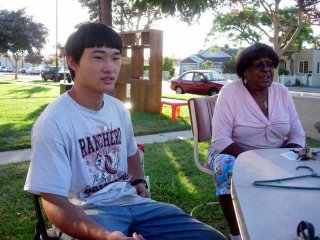
And when she comes home, she bakes cakes for a collection of customers who probably wouldn't know how to do it themselves. If they did, couldn't create something as delightful.
"I'm diabetic," she said, "so don't get to taste them. But I know my friends like them."
Maria has already brought Xiao Mei and our son David into circle of friends. You know it when it happens. She she throws her arms around you in a the way your own grandmother did it. Grandma. Heck, we've already chatted on the phone a couple of times since we reunited.
On Saturday, my friend Marcy Loer brought some things to the sale and helped out. She's a member of an interest group that meets once a month. On Sunday, another friend from the group , Dennis Deschamps, helped out and sold some of his stuff.
I have to tell you (with his permission) that putting the two of us together for an entire day was like staging a reunion remake of "The Odd Couple." The whole reason for the yard sale was to get rid of some of the 30-plus years of junk I've accumulated. The stuff reflects decades of disorganized pack ratting.
If Dennis were a woman and a bit older, you'd think he was Sue Anne Nivens from the Mary Tyler Moore Show. She's the character Betty White played -- the "handy hints" lady who could never resist the opportunity to offer up clever, albeit uninvited, advice.
Dennis knows something about everything and wastes not a moment to share that knowledge. I'm certain he's right about everything he suggests. He's quite brilliant, you know. But I imagine that for him, being with me was a futile as trying to pound out dents in the cars that are in the middle of the Demolition Derby.
If I were to write down all of the suggestions he gave me for doing things better, blogspot.com would shut me down for using up too much space.
The moment I hope I'll never forget was when he saw me putting some hotel soaps in Ziploc bags and marking them for sale at $.25 each. He picked up one as I set it on the table and said, "Wow! This is Neutrogenia! It's great for acne."
Then he shook his head and wagged his finger (again). "You know, you really shouldn't put this out in the sun -- it will melt."
I moved a box slightly to put some shade on the little baggie and get it out of the direct sun. I did it less out of fear of it melting and more out of the desire to make the issue go away. But of course, the sun shifted and, by the afternoon, the Neutrogena looked more like warm honey. When gave me the deserved "told you so" I grabbed my camera and said I'd share my stupidity with the world. Here's the proof if it:
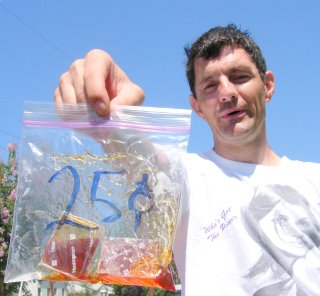
You know, there isn't anybody with whom you don't have something in common. With 48-year-old Terrie Duba, it was the challenge of deciding to accept growing a bit older that made me enjoy learning from her.
The receptionist/concierge at a post-production house had recently decided to embrace her age and experience and allow her natural hair color to grow back. She wasn't, however, ready to call it anything other than "silver." Hey, I'm a guy -- maybe there's a difference.
"I told a lady that I was letting it go silver," Terrie recalled, "and she almost cried. She said, 'Oh no! Don't do it!'"
Terrie may have hesitated for a moment, but moments pass while resolutions live on.
"I've decided to embrace my age," she said.
I thought about it for a minute and it reminded me of something that I should try to remember more often. About 25 years ago I did a one-on-one, on-camera interview with Dr. Leo Buscaglia, the "Love Doctor." He wasn't as popular in the L.A. as he was around the rest of the country. L.A. people -- for all of their cutting edge, self-help, find-your-inner-child, today's-the-first-day-of-the-rest-of-your-life search for "the truth," are not very touchy-feely.
So when Leo Buscaglia, a USC professor who taught "Love 101", recommended hugging each other, people around here wrote him off as something with something up his sleeve or something. Actually, however, he was quite harmless. He was an educator who put stuff on the table for you to take if you wanted to.
He had no stake in whether you decided to embrace loving life and loving people. In Phoenix, however, where I working at the PBS station, he was quite popular.
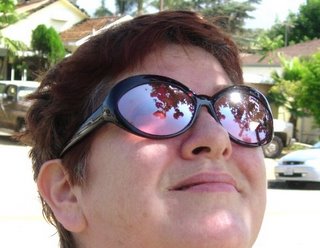
Anyway, I remember him saying, "People say, 'Act your age!'. What the hell does that mean? They say that when you get older you have to give up things. I believe you get old because you do give up things.
"Don't give up anything!"
I was glad that Terrie reminded me. I felt a little less silly wearing my short pants, black shoes and white support stockings.
"How are you doing today," I greeted a mountain of a man who was poking around the wares.
"I couldn't be better," he almost shouted. In fact, I think you could call it a shout. A small shout. A mini-shout.
This is the kind of person I like. When strangers or clerks (or both) ask me how I am -- and they really don't care -- I answer in somewhat the same way, but without so much mini-shout. So I had to get to know this guy.
Everything that came out of Dave Gist's mouth drew me deeper into a world of fascination and admiration. He'd done a lot of outdoor work, he told me, and finally decided he was tired of it. He ended up becoming a screenwriter. He's written 46 films so far -- sold about half of them. They're mostly horror flicks. That was interesting to me. How he got there, though, was a hoot.
"I was in jail and working in the kitchen," he said, without wanting to reveal the offense that landed him there, "and got sick. So they put me in an office had gave me a lot of typing to do.
I couldn't type and I told them so."

"'Well, you can now,' they told me," he said with a smile. "So I started hunt-and-pecking with my two index fingers and, by the time I got out, I was a fast typist. I still type with just these two fingers."
When he got out, his new typing skills -- and his disdain for laboring in the hot sun -- opened the gates into the world of screenwriting. It didn't completely come out of nowhere, however. His father was a well-known director who had also played parts in a slew of films and TV shows. Robert Gist's first role was that of the department store window dresser in "Miracle on 34th Street" in 1947. It seems he appeared in just about every television series I enjoyed as a kid -- from "Sea Hunt" and "Hennessey" to "Gunsmoke" and "Have Gun Will Travel." Dave's dad also appeared in episodes of "Death Valley Days" and "Perry Mason."
"Agnes Moorehead was my stepmother," Dave told me.
I checked it out on IMDB.com (Dave is listed there also) and, if the gossip magazines of the day were true, the six-year relationship and short-lived marriage drew a lot of attention. Her first role had been in "Citizen Kane" in 1941, but most people remember her from her role of Endora in "Bewitched."
She was 24 years older than Robert Gist. Even today, that would make for good tabloid fodder.
But back to his son, Dave. His hunting and pecking produces stories that tend to be more about stalking and then packing the bodies away. I love some of the titles: "Merry Axmas," "In Cold Storage" (you guessed it -- it's about hiding the remains of victims at the local U-Store-It) and "Serial Killing 4 Dummies."
Now wonder he's so darned friendly -- I think he takes out his aggression on fictional characters. Sounds healthy to me!
One of our neighbors donated a little baby seat on a swing thing (OK, so I don't know what it's called. My son was 13 when he arrived. Yikes!). It was the last thing I would figure Anthony Valenzuela would skid his bicycle to a stop to see.
"How much for this?" he asked.
"Make an offer and I promise I'll counter with a better price," I said.
He hesitated. I don't blame him. I don't like it when sellers ask me to make an offer. I usually say "A dollar," just to get the negotiating started. Anthony was silent.
"OK, I said, "How does five dollars sound?"
"That's great," he said. "I'll buy it."
But I reminded him of my counter-offer policy and sold it to him for $4. He was happy.
"I'm going to be a father in November," he said ever-so-proudly. "His name is Elijah. It will be Elijah."
I asked him if he wanted me to deliver it to his place, but he said he could handle it perfectly well on his bike. And he did.

As he was starting to pedal away, he thanked me and said it would help a lot.
"I'm looking for work."
One of the last passersby didn't seem interested in anything we were offering, but I was interested in him. How many people have walked past your place with a bass guitar stapped over the shoulder in playing position and a boa constrictor around the necks? Yes, it was around his neck and the neck of the guitar.
Travis Reinhart's snake is Marilyn. She's 2 1/2 years old and 3 1/2 feet long. He was on his way to loan his guitar to a friend -- Marilyn was just grooving along for a ride.
Travis reminded me that he had been by on Saturday with his dog. His and mine had exchanged words over a territorial dispute that had ended when I put Mija in the house and Travis dragged his pooch away.
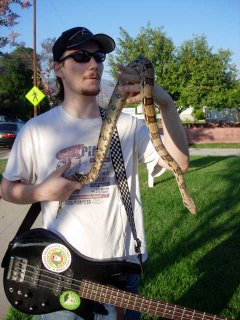
It turns out that Travis loves animals. He's looking for work again at a veterinarian's office. I like people who love animals.
As the afternoon was threatening to turn to evening and dusk, I started posting ads on www.craigslist.com for the three remaining big things: an entertainment wall unit thing, a refrigerator and a table and chair set. I made photos of all of them to include with the descriptions. I got calls right away for information about the refrigerator -- especially its diminsions. I'm not recognized for my drawing and drafting talent, but I'm pretty darned proud of this one -- especially after two days in the hot sun.
Since last weekend's yard sale, whenever I go outside, I feel a little sad. It's like how you feel on the Sunday morning at a big hotel following a great conference. You see the places where, just a day earlier, you felt the excitement of meeting new friends and learning new things. But now it looks like a hotel lobby.
But then I realize that all of these new and renewed friends are not that far away. I know I'll see many of them again and remember, again, why I love my neighborhood.

 I tried my best to not think about the Christmas holidays, but I looked up when I walked outside the FedEx-Kinko's and saw this.
I tried my best to not think about the Christmas holidays, but I looked up when I walked outside the FedEx-Kinko's and saw this.








